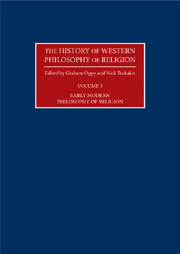Book contents
- Frontmatter
- Contents
- Editorial Introduction
- Contributors
- 1 Early Modern Philosophy of Religion: An Introduction
- 2 Niccolò Machiavelli
- 3 Martin Luther
- 4 John Calvin
- 5 Michel de Montaigne
- 6 Francisco Suárez
- 7 Thomas Hobbes
- 8 René Descartes
- 9 Ralph Cudworth
- 10 Blaise Pascal
- 11 Baruch Spinoza
- 12 John Locke
- 13 Gottfried Wilhelm Leibniz
- 14 George Berkeley
- 15 Voltaire
- 16 The Deists
- 17 Jonathan Edwards
- 18 Thomas Reid
- 19 David Hume
- 20 Denis Diderot
- 21 Immanuel Kant
- 22 Gotthold Ephraim Lessing
- 23 William Paley
- Chronology
- Bibliography
- Index
8 - René Descartes
- Frontmatter
- Contents
- Editorial Introduction
- Contributors
- 1 Early Modern Philosophy of Religion: An Introduction
- 2 Niccolò Machiavelli
- 3 Martin Luther
- 4 John Calvin
- 5 Michel de Montaigne
- 6 Francisco Suárez
- 7 Thomas Hobbes
- 8 René Descartes
- 9 Ralph Cudworth
- 10 Blaise Pascal
- 11 Baruch Spinoza
- 12 John Locke
- 13 Gottfried Wilhelm Leibniz
- 14 George Berkeley
- 15 Voltaire
- 16 The Deists
- 17 Jonathan Edwards
- 18 Thomas Reid
- 19 David Hume
- 20 Denis Diderot
- 21 Immanuel Kant
- 22 Gotthold Ephraim Lessing
- 23 William Paley
- Chronology
- Bibliography
- Index
Summary
In his Lectures on the History of Philosophy, Hegel declared that:
Descartes is in fact the true inaugurator of modern philosophy, which makes thinking into a principle. Here thinking in itself is distinguished from philosophical theology, which distances itself from thinking … The influence of this man on his time cannot be overestimated. He is a hero who embarked upon the subject entirely from scratch and established a new foundation for philosophy.
(Hegel 1982: 123)Descartes recognized that the mind innately possesses the rudiments of truth, and that these rudiments form the foundation of an edifice of knowledge that promises to render human beings “the masters and possessors of nature” (Descartes 1985: 141–2). In pursuing this programme, Descartes established a rigorous distinction between articles of faith and systematic insights of reason, thereby unwittingly setting up an opposition between reason and faith that was inconceivable to the likes of Augustine and Thomas Aquinas. That Descartes did not intend to establish such an opposition is evident from his efforts to argue for an inner compatibility between faith and reason, as well as from a reflection on the Christian roots of his programme for the mastery of nature. Descartes sought to correct the mistakes and misconceptions of a tradition of medieval philosophy that had commingled faith and reason in a manner that prevented genuine progress in the sciences.
- Type
- Chapter
- Information
- The History of Western Philosophy of Religion , pp. 101 - 112Publisher: Acumen PublishingPrint publication year: 2009

